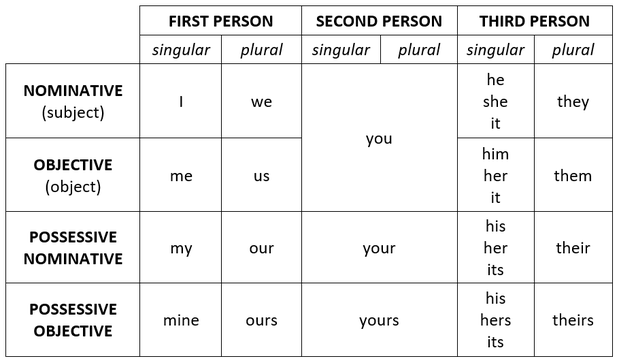I hardly ever listen to the radio, and when I do it's usually country radio--I know, I know. Therefore, I'm usually in the dark about the new hit songs that are playing. Yesterday I was introduced to Him & I by G-Eazy ft. Halsey while listening to the radio in my girlfriend's car.
If you're like me and haven't heard the song yet, here is their performance on Good Morning America because I can't link the music video:
Halsey's one of my favorite artists, so my girlfriend was surprised that I hadn't heard of this song yet.
As we listened and heard the song multiple times throughout the day, she remarked, "Isn't that not correct? 'Him and I'?"
I thought she was saying the "him" part was incorrect. I said it was fine, that because "him and I" is the object of the sentence "In the end, it's him and I." Then she said, "Shouldn't it be 'him and me'?"
Let's explore that, shall we?
The "you and I" or "you and me" debate is one that's plagued me for almost my whole life. I remember being corrected on it several times as a child, but as I grew older nobody cared anymore. Much like who vs whom, the proper distinction is fading and both options tend to sound right to native English speakers.
We know when it's right to use "I" or "me" in other situations. For example, we would never say, "Me am going to the store," or "Give that ball to I." Yet it seems we switch me and I pretty frequently when an and gets involved.
Is it "Me and Joe are going to the store" or "Joe and I are going to the store"? Is it "The estate is going to Mary and I" or "The estate is going to Mary and me"? And even then, does the I or me come before or after the other name(s) or pronoun(s)?
If we look prescriptively at what should be right, then I should always be used in the subject ("Joe and I are going to the store"), and me should always be used in the object ("The estate is going to Mary and me"). In fact, if you get rid of Joe and Mary in the example sentences, you still get a grammatically correct sentence: "I [am] going to the store," and "The estate is going to me."
Therefore, the lyric "In the end, it's him and I" is prescriptively incorrect and should be "him and me."
BUT, what is right prescriptively is not always what we do.
All four of the example sentences I gave above sound fine to me and are sentences I would not be surprised to hear coming from any English speaker's mouth. In fact, "The estate is going to Mary and I" sounds more correct to me than the actually correct "The estate is going to Mary and me," or at least more formal than "Mary and me."
It turns out that this is a result of hypercorrection in English speakers. Because speakers were always corrected against using me in the subject, speakers tried to avoid me even further by replacing it with I even when me is actually correct. Prescriptive ideas tend to align with ideas of prestige in language use, and so the usage of I in the object has a more formal connotation to it.
Therefore, while the lyric "In the end, it's him and I" is prescriptively incorrect, it's actually a result of hypercorrection because of prescriptivism and sounds more formal or prestigious than "him and me" would.
Interestingly, the issue of me and I is also complicated further by the fact that the third person pronouns don't follow the same pattern as the first person pronouns should. (I'm leaving out second person because it's all you, which is a whole other basket of fun that I'll post about in the future.)
The singular nominative first and third person pronouns are I, he, she. We've established that the subject pronoun should be used when in the subject position ("Joe and I are going to the store"). But "Joe and he" or "Joe and she are going to the store" do not sound right, but "Joe and him" or "Joe and her are going to the store," the objective pronouns, do.
Let's look at the objective pronouns: me, him, her. Prescriptively, they should be in the object ("The estate is going to Mary and me.") And it turns out that "The estate is going to Mary and him" or "Mary and her" do sound right.
So even with third person pronouns, we see the objective form in the subject position, and that is grammatically correct.
I believe this occurrence with the third person pronouns is why me started cropping up in the subject position as well. Grammarians fought against it, which led to hypercorrection, and now we have a subject pronoun commonly found in the object position--ironically, the opposite of what the grammarians were going for.
There you have it, a very long-winded explanation for why, in the end, it's him and I.
More reading/my sources:
- https://allthingslinguistic.com/post/74887458423/why-do-we-get-confused-about-you-and-me
- https://english.stackexchange.com/questions/1047/which-is-correct-you-and-i-or-you-and-me
- https://www.thoughtco.com/hypercorrection-grammar-and-pronunciation-1690937
- https://www.thoughtco.com/i-and-me-1689417

No comments:
Post a Comment